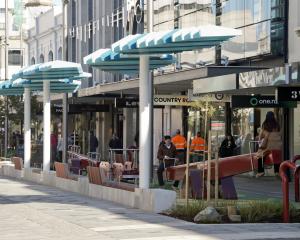Calvin Oaten runs his calculator over Dunedin City Council debt.
It was with some consternation that we citizens received the recent announcement by Fisher & Paykel Ltd that it was to close its manufacturing operations at Mosgiel.
It was further compounded by the news that Tamahine Knitwear was also to close. The total loss of jobs is some 500.
This follows recent losses of Wickliffe Press, Cottonsoft Products, Mainland Cheese and Sealord Fisheries. These companies, without exception, were the recipients of substantial financial benefits from the DCC.
All closures were the result of commercial decisions made to conform with the demands of globalisation and consequent market forces.
Entirely predictable by all except, seemingly, those in our Town Hall. They have, for many years, believed that by picking winners and delivering financial benefits these forces can somehow be thwarted.
Where now for Dunedin? Well, it seems that our population is destined to remain fairly static at around the 120,000 level, so we should perhaps accept that fact and adapt to it. Is this negative? Perhaps so, but realistic nonetheless.
Dunedin still has a vibrancy about it, and as many say, it is an ideal size where we can access most things and still go home for lunch. Do we really want to be twice the size, even if that was possible?
There are many businesses which beaver away unassisted, showing all signs of being prosperous, run by people who have learned to deal with the cyclical nature of trade.
There will always be the failures and there will always be emerging entrepreneurs who will make an impact.
We have the health and education industry in the university and polytechnic institutions which are, lets face it, the backbone of this city.
There are of course the other rapidly growing businesses which unfortunately will not go away. These are our local governments, both Dunedin City Council and the Otago Regional Council.
Each of these organisations has shown a propensity to get ever larger despite our static growth, and to make ever increasing calls on the citizens' pockets.
Having studied the Dunedin City Council's development for close to 10 years, I find the prognosis positively frightening. The exponential growth, despite the city's static population is seemingly out of control.
Take just some factors and you will see what I mean. In the Long Term Plan of 2001-02 the net debt was to peak in 2006 at $86 million and the 10-year capital expenditure was to be $231.1 million.
Seven years later, the current draft long-term plan shows the debt peaking in 2010 at $330 million and capital expenditure at $712.69 million.
It gets worse.
The convoluted process by which it is proposed to disguise the cost of the stadium, will be to put this debt upon the Dunedin City Holdings group of companies. As at June 30, 2007 the accounts of these companies showed long-term debt at $244 million.
Add the $92.4 million for the stadium and we have a total of $336.4 million. As the owners of these companies, this means that the citizens will, by 2010 be responsible for $666.4 million of debt.
To pay this off over 20 years with interest at 8% pa would cost 53,000 ratepayers $22,632.40
each.
We have a projected rate increase next year of 12.5%, even allowing for an increase of 9% to $18.8 million in the dividend from DCHL (assuming, of course, that they can produce it).
The outlook shows rates increasing 76% by 2017. Staff costs have increased from some $22 million in 2001-02 to a projected $53.775 million in 2017.
Seriously, it seems that the biggest threat to the viability of Dunedin, is not the loss of some jobs by the moving of a few companies, but rather, by the tsunami of debt rapidly descending upon us through the ill-considered actions of the administration of this city, aided and abetted
by, in my opinion, an incompetent elected mayor and council.
- Calvin Oaten is a Dunedin ratepayer.












